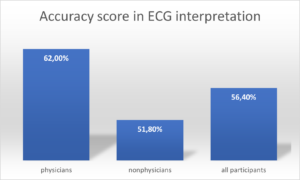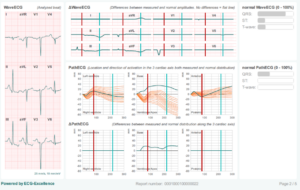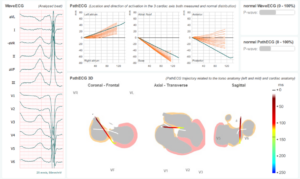After reading the results of recent revealing study regarding the expertise in ECG Interpretation by a Mayo clinic team, the conclusion is again clear: ECG interpretation should and can improve.
In this study which was conducted and evaluated by leading ECG experts such as Anthony Kashou, Steven Smith, David Albert (and many other)s the level of competence for reading and interpreting 12 lead ECG data was analysed. For the study 30 patient cases (urgent and non-urgent mix) were selected and the standard 12-lead ECG data was presented to a international group of medical professionals from different training levels and different disciplines. Within this group of 1206 professionals the following categories were use: Primary Care Physicians, Cardiology fellows in training, Resident physicians, medical students, advanced practice providers, nurses and allied health professionals.
Each participant was asked to evaluate the 12-lead ECG data and record their level of confidence in the assessment results and the time it took them to reach a decision.
The study results will be published in the October 23 volume of Current Problems in Cardiology (Volume 48, issue 10) but are already available on science direct.
Still so much room for improvement in ECG interpretation
On average and overall the participants took close to 2.5 minutes to read and interpret an ECG and the had a high confidence in the quality of their findings.
Yet the average accuracy of the ECG interpretation was 56.4%.
And this figure is rather close to the results of a study published in JAMA Internal Medicine in September 2020 in which the average percentage of correct interpretation was 54%.

In the previous study the difference in performance of ECG interpretation was mainly focused at cardiologists versus non cardiologist. In this study the category differentiation is much more divers. Next to groups of experts such as Cardiology Fellows in training and resident physicians (from family -, internal – and emergency medicine), the category of Primary Care Physicians with a background in family and internal Medicine was recognized. Plus a large group of non-physicians including nurses, physician assistants and nurse practitioners.
The key finding of the recent study is that there are significant gaps in the ECG interpretation proficiency among healthcare professionals. And as can be expected (and it should) the Cardiology Fellows demonstrated a superior performance across all metrics. As a group the Cardiology Fellows scored a 69.3% in accuracy against the 30 ECG cases. The Primary Care Physicians scored close to 60% as did the resident physicians.
The nurses and advanced practice practitioners scored an average in accuracy of 50% which comes close to tossing a coin.
Another finding is the score in confidence level regarding the ECG interpretation. Only the Cardiologists Fellows scored over slightly over 1 on a scale of 0-2 in which indicates confident and 1 ‘somewhat confident’. For all participants the overage confidence was 0.83 (and thus below somewhat confident)
Recommendations as expected
The results of this study again highlight the gap not only between different groups of physicians in reading and interpreting a basic health instrument. It also demonstrates again the relative low performance which is achieved even among the expert participants. Per category of medical professionals no group scored over 70% in accuracy. In some diseases the accuracy in ECG interpretation was really low (e.g. bundle branch blocks and LVH).
From our own team of ECG experts we know an ECG is often difficult to interpret. Detecting abnormalities in relative low resolution graphs is extremely difficult when you lack the base of what normal should look like and when you are not sure on the quality of the data since the ECG graphs are influenced by all kind of factors such as heart orientation, electrode positions, tissue conduction differences and today’s software support which converts the digital ECG signal to the graphs a medical professional has to interpret.
For years and years the key recommendations are an increase and change in training methods and investing more time in ECG interpretation experience.
As expected introducing Artificial Intelligence can support medical professionals in achieving better interpretation results. But these AI models are also based on the same data and accuracy levels we are now confronted with for decades.
And now for something completely different…
Therefore we suggest to try a different approach towards ECG interpretation. As classic wisdom suggests it is often easier to solve a puzzle by adding more information. And this is the path we applied for making ECG interpretation easier and better.

Our CineECG approach relates the ECG data to the heart anatomy, our electrical pathway analysis focuses on the difference between a normal healthy pattern and the recorded values and the overall sensitivity, across the whole activation and recovery cycle, supports physicians in boosting their accuracy levels.

Keep following this blog and in the coming weeks we are sharing more and more patient cases to demonstrate ECG interpretation should and can improve.